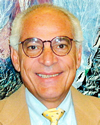 Farouk El-Baz |
2014 International Section Distinguished Career Award
Presented to Farouk El-Baz
Citation by Nazrul Khandaker
GSA International Section is proud to share the excitement along with numerous earth scientists about Dr. Farouk El-Baz being the recipient of the 2014 Distinguished Career Award. From our point of view it was an easy yet quite compelling task to recognize Farouk’s long standing affiliation with the GSA and affiliated societies particularly GSA International Section (GSA IS). Farouk’s contribution to advance desert research and utilize remote sensing data to uncover geologic mysteries under Sahara Desert in the seventies kept him fully engaged and enabled him to reach out so many individuals from sub-Saharan countries which certainly brought science and society together. Farouk is truly a geoscientist without border and his academic excellence and humanitarian contribution is second to none. His professional career began by teaching geology at Asyut University, Egypt (1958-1960) and Heidelberg University, Germany (1964-1965). In 1966, he joined the Pan American – U.A.R. Oil Company, where he participated in the discovery of El-Morgan, the first offshore oil field in the Gulf of Suez. As a Research Professor and Director, Center for Remote Sensing, Boston University, he wore many hats and quite amazingly dealt with a wide variety of geoscience and socio-political issues and often brought to a successful completion. Farouk believes in international collaboration and always emphasizes on mutual respect and cultural tolerance. We haven’t seen too many individuals like him who relentlessly continued to leave lasting impression on humanity through his thoughtful and caring work. GSA IS was fortunate to have his presence and wisdom with respect to its restructuring and launching of the GSA International and on behalf of the entire management board and overseas participants, let us celebrate this wonderful occasion and echo with Apollo mission 15, Command Module Pilot Alfred Worden’s comment, “After the King’s [Farouk's nickname] training, I feel like I’ve been here before.”
 2014 International Section Distinguished Career Award — Response by Farouk El-Baz
2014 International Section Distinguished Career Award — Response by Farouk El-Baz
I came to the U.S. in 1960 on a graduate scholarship at the Missouri School of Mines and Metallurgy in Rolla, MO. That year, I saved enough money to attend the GSA Annual Meeting. The unforgettable experience of enjoying lectures by, and rubbing shoulders with, eminent geologists encouraged my remaining a member ever since.
With a Ph.D. on the Missouri Lead Belt, I taught mineralogy at Heidelberg University in Germany, then worked in offshore oil exploration in the Gulf of Suez. Upon immigration to the U.S. in 1967, my first job was to interpret lunar photographs in preparation for the Apollo missions to the Moon. Soon, I became Secretary of the Lunar Landing Site Selection Committee, and Chairman of Astronaut Training in Orbital Observation and Photography.
In 1973, I joined the Smithsonian Institution to establish the Center for Earth and Planetary Studies at the National Air and Space Museum. Joint work with Soviet counterparts included discussing joint production of lunar maps. In addition, I was asked to plan the Earth Observations and Photography Experiment on the Apollo-Soyuz earth-orbital mission – the first joint American-Soviet project of 1975.
President Anwar Sadat of Egypt invited me in 1974 to conduct research in Egypt and I began studying its Western Desert with Egyptian colleagues. Utilizing satellite images revealed potential areas for economic development. Four years later, President Sadat appointed me Science Adviser. He continued to show interest in research results to the extent that he once spent two weeks with us in the field - using a helicopter. Many of the agricultural projects initiated then continue to serve the people of Egypt today.
This encouraged investigations of landforms in major deserts including the Rajasthan of India, northwestern China, the Arabian Peninsula, in addition to the African Sahara. Emphasis was placed on groundwater potential in these deserts. The work in Darfur, in particular, was highly apprized by the United Nations and used to satisfy urgent needs of refugees from the political unrest.
Much of that work was conducted at the Boston University Center for Remote Sensing, which was established in 1986. This allowed me to interact with the international geologic community at large. Thus, I served as Chair of the U.S. National Committee on Geological Sciences of the National Academies, with emphasis on strengthening UNESCO programs.
Because of my belief in international geologic cooperation, It was gratifying that the GSA established the “Farouk El-Baz Desert Research Award” to yearly reward a distinguished researcher in the field. In addition, because students greatly contribute to generating new ideas and approaches, GSA also established the “Farouk El-Baz Student Research Award” to be given yearly to two students (one male and one female) to support field research on arid landforms anywhere in the world.
Because I firmly believe in the significance of joint research with international colleagues, I accept with great humility and pleasure the “Distinguished Career Award” of the GSA International Section. I look forward to increased activity in this regard by the new initiative of GSA International.
